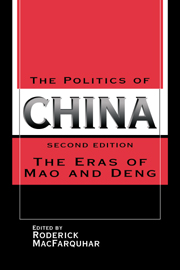Book contents
- Frontmatter
- Contents
- Preface
- List of tables and maps
- List of abbreviations
- Introduction
- 1 The establishment and consolidation of the new regime, 1949–57
- 2 The Great Leap Forward and the split in the Yan'an leadership, 1958–65
- 3 The Chinese state in crisis, 1966–9
- 4 The succession to Mao and the end of Maoism, 1969–82
- 5 The road to Tiananmen: Chinese politics in the 1980s
- 6 Reaction, resurgence, and succession: Chinese politics since Tiananmen
- Appendixes: Leaders and meetings
- References
- Index
3 - The Chinese state in crisis, 1966–9
Published online by Cambridge University Press: 05 June 2012
- Frontmatter
- Contents
- Preface
- List of tables and maps
- List of abbreviations
- Introduction
- 1 The establishment and consolidation of the new regime, 1949–57
- 2 The Great Leap Forward and the split in the Yan'an leadership, 1958–65
- 3 The Chinese state in crisis, 1966–9
- 4 The succession to Mao and the end of Maoism, 1969–82
- 5 The road to Tiananmen: Chinese politics in the 1980s
- 6 Reaction, resurgence, and succession: Chinese politics since Tiananmen
- Appendixes: Leaders and meetings
- References
- Index
Summary
The Great Proletarian Cultural Revolution, which by official Chinese reckoning lasted from the beginning of 1966 to the death of Mao Zedong some ten years later, was one of the most extraordinary events of this century. The images of the Cultural Revolution remain vivid: the young Red Guards, in military uniform, filling the vast Tiananmen Square in Beijing, many weeping in rapture at the sight of their Great Helmsman standing atop the Gate of Heavenly Peace; veteran Communist officials, wearing dunce caps and placards defiling them as “monsters” and “freaks,” herded in the backs of open-bed trucks, and driven through the streets of major cities by youth only one-third their age; the wall posters, often many sheets of newsprint in size, filled with vitriolic condemnations of the “revisionist” or “counterrevolutionary” acts of senior leaders. The little red book carried by the Red Guards – a plastic-bound volume containing selected quotations from Chairman Mao – remains a symbol of the revolt of the young against adult authority.
From a purely narrative perspective, the Cultural Revolution can best be understood as a tragedy, both for the individual who launched it and for the society that endured it. The movement was largely the result of the decisions of a single man, Mao Zedong. Mao's restless quest for revolutionary purity in a postrevolutionary age provided the motivation for the Cultural Revolution, his unique charismatic standing in the Chinese Communist movement gave him the resources to get it underway, and his populist faith in the value of mass mobilization lent the movement its form.
- Type
- Chapter
- Information
- The Politics of ChinaThe Eras of Mao and Deng, pp. 148 - 247Publisher: Cambridge University PressPrint publication year: 1997
- 6
- Cited by



